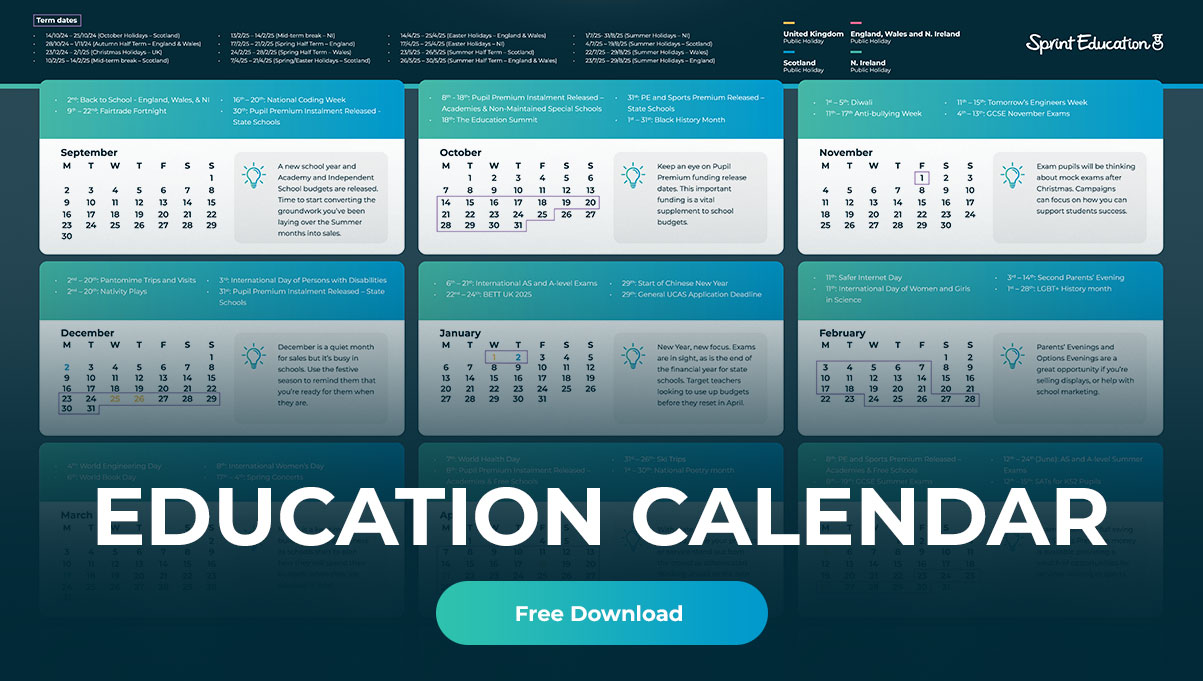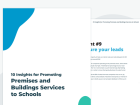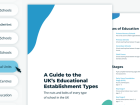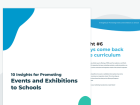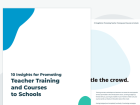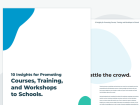A Guide to the UK’s Educational Establishment Types
A Guide to the UK’s Educational Establishment Types
Learn exactly who you're selling to with your schools marketing with our breakdown of every educational establishment across the UK.
Learn exactly who you're selling to with your schools marketing with our breakdown of every educational establishment across the UK.
State Schools
Including: Infants, Infants with Nurseries, Nurseries, Junior Schools, Middle Schools, Primaries with Nurseries, Primaries, Primaries with Secondaries, Secondaries, Grammar Schools, High Schools, and Specialist Colleges.
State Schools provide free education to pupils between the ages of 3 and 18. Every child in England between the ages of 5 and 16 is entitled to a free place at a State School, which 93% of them take. With the exception of Grammar Schools, which admit pupils based on their academic ability, anyone can attend a State School.
‘State Schools’ is a widespread term that covers all schools who receive government funding, specifically:
- Academies and Free Schools.
- Community Schools: Where the local authority owns the facility, employs staff, and handles admissions.
- Foundation Schools: Where the governing body employs staff and handles admissions, and sometimes owns the building (it may alternatively be owned by a charity).
- Voluntary Aided Schools: Similar to Foundation Schools, but financially supported by, commonly owned, and largely run by a foundation or trust (typically a religious organisation).
- Voluntary Controlled Schools: Owned by foundations or trusts, but with the local authority employing staff and holding the primary responsibility for admissions.
Academies and Free Schools fall under the name of State Schools as they receive funding from the government, despite not being overseen by the local government. All other types of State School are known as ‘Maintained Schools’, as they are maintained by the local authority. Maintained Schools are free to allocate their funds received by their local authority, but the government do hold back funds for central services. Academies and Free Schools can fully dictate all funds, including those usually provided by the local authority.
With the exception of Academies and Free Schools, all state schools must follow the National Curriculum, although they can focus on specific subjects provided the National Curriculum requirements are met. Pupils are assessed at all key stages, and the school is regularly inspected by their country’s inspection board. Maintained Schools also cannot set their own pay or working conditions, and have their performance managed by the local authority.
Academies
Including: Primaries, Primaries with Secondaries, Secondaries, and Multi-Academy Trusts
Academies are independent state-funded schools who receive their funding directly from the central government as opposed to via their local authority like most State Schools.
There are two types of Academies; Sponsored Academies, and Converter Academies. Sponsored Academies are typically underachieving schools who convert to an Academy with the involvement of outside sponsors. Converter Academies are schools who’ve been rated ‘Good’ or ‘Outstanding’ by their inspection board, and convert to an Academy themselves. The conversion process takes around three to six months.
Academies have far more freedom than regular State Schools. They do not have to follow the national curriculum (although still must offer a ‘broad and balanced’ delivery and certain subjects) and can regulate their own admission policies, term dates, staff pay, and budget spending. They can’t run for profit, but they can dedicate larger amounts of funding to specific subjects, offer staff bonuses, create new job roles, and generally run a more ‘business-like’ approach.
However, Academies do not have total freedom. They are still inspected by their inspection board, and they’re run by Multi-Academy Trusts, which essentially act as the ‘head hub’ of a group of academies operating in partnership. A Trust may run anything from a single Academy (where it is known as a Single-Academy Trust) to up to 40, which don’t necessarily have to be in the same area of the country.
MATs also cannot run for profit, but are primarily focused on their Academies’ funding and the way they spend their budgets. They can overthrow the decisions of the SLT in each Academy if they feel the budget isn’t spent correctly, and even take funding from one Academy to give to another (known as General Annual Grant pooling).
Free Schools
Including: Primaries, Primaries with Secondaries, Secondaries
Established in 2010 under the Government’s Free School Initiative, Free Schools are a type of Academy found in England. In official terms, an Academy is labelled a Free School if it was established under the Initiative as opposed to being an existing school that converted to Academy status.
Run on a not-for-profit basis, they may be set up by groups including parents, teachers, charities, and businesses, in areas with a perceived local need for more schools. Most Free Schools are similar in size and shape to other Academies, but also include:
Studio Schools: Establishments with around 300 pupils that deliver mainstream qualification and academic subject learning through project-based learning in realistic working environments.
University Technical Colleges: Establishments that specialise in subjects such as Engineering or Construction alongside Business and IT skills. They also offer academic subjects alongside practical subjects to provide technical qualifications. These types of Free School are sponsored by a university, employer, or FE college.
Free Schools are similar to Charter Schools in the US and Canada, and Designated Special Character Schools and Partnership Schools found in Sweden, Chile, and New Zealand.
Independent Schools
Including: Nurseries, Primaries, Primaries with Secondaries, and Secondaries
Independent Schools, also known as Private Schools, are fee-charging schools that receive no state funding, instead relying on tuition fees, gifts, and endowments. Some may also hold charity status.
Running independently, they are similar to Academies in that they don’t have to follow the State School National Curriculum, and have much more control over staffing, spending, and the length of the school day and term, to name a few. Class sizes are often far smaller – 9:1 on average – and, like other academies, schools in England and Wales do not require teaching staff to hold Qualified Teacher Status.
Independent Schools can vary in size and entry requirements – there are zero common bonds other than their funding sources. They may also be known by a few different names:
Public Schools are historically the most exclusive and expensive of boys’ private schools, and they’re now often attended by any pupil aged 13 to 18.
Pre-Prep and Prep Schools are Independent Primary Schools for pupils aged 3-7/8 and 7-11/13 respectively.
Boarding Schools are schools with the facilities to host pupils overnight for termly or weekly periods. Not every Boarding School is an Independent School, but most are.
Approximately 7% of all children and 18% of 16+ students in Britain attend the UK’s 2,600 Independent Schools. The average annual cost per pupil is £14,100 for day school, and £32,250 for boarding school. Independent Schools are inspected by their country’s inspection board, the Independent Schools Inspectorate, or the School Inspection Service.
Special Schools
Including: Primaries, Primaries with Secondaries, and Secondaries, Special Needs Colleges
Special Schools are, in essence, very similar to their mainstream counterpart. That is, a Special School maintained by the local authority would still need to follow the National Curriculum and government assessment procedures. All mainstream schools are required to provide facilities for SEND pupils, and most required to establish clear SEN policies or follow those laid out by the local authority. Some SEND pupils may thrive in mainstream schools with these resources and targeted support, but many may need more intense provisions and require education at a Special School. Only pupils with Educational Health and Care Plans are able to attend Special Schools, although having a plan does not guarantee a place nor require pupils to leave mainstream schooling if they don’t wish to.
Special Schools are typically a lot smaller than other schools, with smaller class sizes that offer more one-to-one help, and a larger workforce made up of specialist staff who better understand the needs of SEND pupils and can tailor their delivery to suit learning styles and strengths. Work is tailored to each pupil and their individual targets, and progress is closely monitored to provide better outcomes.
Most Special Schools provide in-house or visiting NHS therapist care, including Speech and Language Therapists, Occupational Therapists, and Physiotherapists.
Pupil Referral Units
Pupil Referral Units offer alternative education to pupils unable to attend mainstream school and may otherwise not receive adequate education. Typically, this includes pupils who’ve been away from school due to short or long-term illness, permanently excluded from their school, experiencing emotional or behavioural difficulties, and any child who needs greater care and support than their mainstream school can provide.
SEND pupils may attend Pupil Referral Units for short periods of time while waiting for a long-term solution (such as a place at a Special School). For all pupils, Pupil Referral Units are designed to be a short-term measure to address any issues and get pupils back into mainstream school as quickly as possible. That said, some may choose to remain in the unit until they finish full-time education.
Pupil Referral Units are funded by the local authority, and follow most State School guidelines. However, like Academies and Free Schools, they don’t have to follow the National Curriculum, provided they deliver a ‘broad and balanced’ curriculum that must include English, Maths, Science, IT, and PSHE. They also put a much larger focus on personal development, such as teaching socialisation, behaviour, and anger management skills.
Pupil Referral Units are similar in size to Special Schools, with much higher teacher:pupil ratios in the classroom. Teaching and learning is, again, tailored to individual pupils’ needs to improve attendance and attainment. This is evident in inspection ratings, with a higher percentage rated Outstanding than mainstream schools.
Centres
Education Centres are schools that offer personal development, education support, and targeted interventions for pupils with physical or developmental delay. Most centres will specialise in supporting pupils with a certain illness or condition, such as deafness or cerebral palsy. This allows for much more targeted support and better outcomes, and the centres will employ specialist staff who fully understand pupils’ needs to support this.
Education Centres are often State Schools maintained by the local authority, and may be grouped with Special Schools, yet, again, do not have to follow the National Curriculum. However, some are based inside other State Schools, so many of the curriculum targets and school policies are carried over into the Centre as far as possible. Some pupils may be fully educated within the Centre, although some may still spend some time in the attached school’s mainstream lessons.
Education Centres are often the smallest of all establishments, with many educating just a handful of pupils.
Further Education
Further Education covers all forms of education between the ages of 16 and 18, covering all qualifications lower than a degree. As of 2014, it is now compulsory for students to stay in some form of Further Education, which may include Sixth Form Colleges, independent Further Education, or apprenticeships.
Several qualifications may be gained during Further College, by far the most common being the AS Levels and A Levels studied at Sixth Form. Others include Diplomas, BTEC Nationals, HNCs, NVQs, and TechBacs. Students must study towards at least one of the above.
In the UK, the Education Skills and Funding Agency funds further education colleges, schools and academies with sixth forms, special colleges, the National Apprenticeship Scheme, and the National Careers Service. The funding covers all students between the ages of 16 and 19 for the above qualifications, and those up to the age of 25 if they hold a Education, Health and Care plan. Most Further Education providers are run as State Schools, specifically either maintained, Academies, or Free Schools.
Higher Education
Including: Higher Education Colleges and Universities
Higher Education refers to any education undertaken that results in a level 4 or above qualification. Most commonly, these are bachelor’s, master’s, or doctoral degrees taken at a university, but can also include foundation degrees and HNDs.
Many of these qualifications are typically considered to be full-time, yet most offer drastically fewer learning hours a week than standard under-18 full-time education. Many students studying these qualifications will have at least a separate part-time if not full-time job at the same time. Some qualifications, such as a degree apprenticeship, offer a career and qualification in one.
Most Higher Education Establishments, such as Universities, are privately owned and run, but many receive substantial government funding to cover teaching and research, and thereby must follow certain government policies. Universities do not follow a national curriculum, although courses will broadly include the same content in each university.
The remaining funding comes from the students themselves, who must pay for tuition unless they receive bursaries or scholarships from the government, or even charities or businesses. Other types of qualification, such as the degree apprenticeship, are fully covered by the students’ employer and government grants, with the student paying no education fees.
Phases of Education
Private Nursery Schools: Part or full care for children aged between 2 - 4 years old.
Primary Schools: Schools teaching those between the ages of 4 – 11.
Secondary Schools: Schools teaching those between the ages of 11 – 16 (which may or may not have associated Sixth Forms).
Sixth Forms: Schools teaching those between the ages of 16 – 18 (which may or may not have associated Seondary Schools).
Key Stages
Pupils complete fixed learning stages while at school. Each stage concludes with a final assessment.
Early Years Foundation Stage (EYFS): Nursery and Reception. Ages 3 – 5.
Key Stage 1: Primary School Infants, Years 1 and 2. Ages 5 – 7.
Key Stage 2: Primary School Juniors, Years 3 - 6. Ages 7 – 11.
Key Stage 3: Secondary School Years 7 - 9. Ages 11 – 14.
Key Stage 4: Secondary School Years 10 and 11. Ages 14 - 16.
Key Stage 5: Sixth Form. Ages 16 – 18.
What Next?
There you go – a brief run-down of all 32 school types you can market to in Campus. But there’s no time to waste – those 32 school types equate to over 30,000 schools and 400,000 teachers all waiting to hear from you!
When you’re ready to reach out to them, plus learn more about which schools your business must be emailing, get in touch on (info@sprint-education.co.uk)[mailto:info@sprint-education.co.uk] or 01684 297373 for a walkthrough of Campus.
Tags
Database of Schools
Education Data
Education Database
Schools Database
Similar Articles
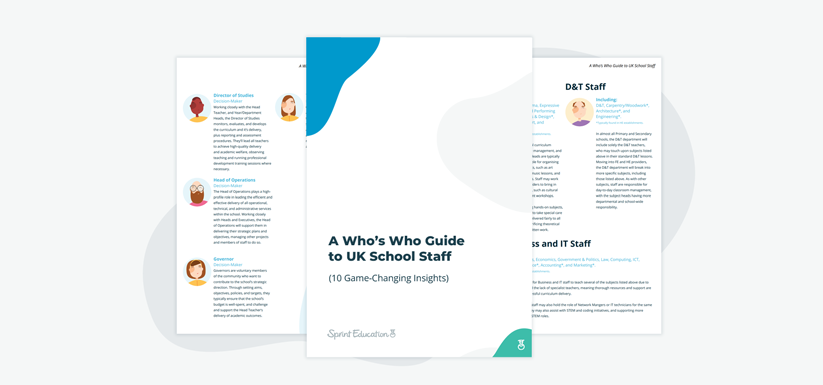

A Who’s Who Guide to UK School Staff (Part 3)
Target your schools marketing with our breakdown of the roles and responsibilities of every school decision-maker and influencer in the UK.
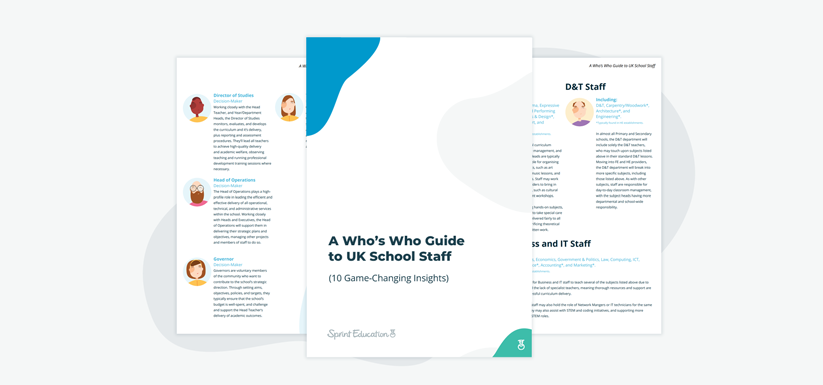

A Who’s Who Guide to UK School Staff (Part 1)
Target your schools marketing with our breakdown of the roles and responsibilities of every school decision-maker and influencer in the UK.


Expert marketing to schools support and solutions
Expert marketing to schools solutions
Email Head Teachers, Teachers, and Staff Inboxes
Email teachers and staff inboxes
Sell More to UK and Global Schools and Colleges
Sell more to schools and colleges

















